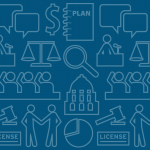This month, we look at how concepts of freedom and autonomy are used in conversations about governmental efforts to protect and improve people’s health and well-being in our communities. We highlight bills that reflect a shift toward concepts of freedom that affirm the individual liberties of all people by recognizing our interdependence with others and the systems in which we interact.
As public health practitioners and advocates, we believe that the preconditions for individual health and well-being are communal and systemic. By improving the underlying conditions in which we all live, learn, work, and play, public policies and services ultimately enhance each person’s ability to pursue their own version of happiness and well-being. Yet in conversations about public health efforts by government bodies, the language of “liberty” and “rights” is sometimes used in ways that obscure our interdependence and favor the choices of certain individuals, often at the expense of people who are more marginalized in our society.
We have seen this trend, for example, in the ongoing wave of legislative attacks on public health authority fueled by politicized COVID-19 backlash. These attacks have been framed as protecting certain individual liberties, such as freedom of religion, without acknowledging implications for the important freedoms of people like frontline workers, immunocompromised persons, and older adults who face greater risks during a pandemic.
At the same time, we have seen bills that reflect a shift toward a more relational understanding of freedom — one that affirms the individual liberties of all people in our communities, regardless of, for example, their beliefs, racial or ethnic background, or income level. Here are some recent examples:
- Maine enacted a law in March 2021 that requires state-regulated health insurance companies to continue providing no-cost access to COVID-19 screening, testing, and immunization after expiration of the civil state of emergency. Framed as establishing a “COVID-19 Patient Bill of Rights,” the law emphasizes collective responsibility to ensure everyone’s access to public health services and illuminates the relationship between individual choices and everyone’s health and freedom.
- New Mexico enacted a law in March 2023 that prohibits public entities from interfering with access to reproductive and gender-affirming health care or discriminating against a person based on their use of such services. Entitled the “Reproductive and Gender-Affirming Health Care Freedom Act,” the law uplifts and protects individual rights and freedoms targeted by politicized campaigns couched in the language of “religious liberty” and “parents’ rights.”
- California enacted a law in September 2023 that prohibits school boards from banning or censoring learning materials on the basis that they contain inclusive and diverse perspectives. The law expressly affirms the “fundamental right” to education under the California Constitution — including students’ rights to share ideas and beliefs and receive information and knowledge — and recognizes that accurate and inclusive education is essential to the success of all students, including trans and other LGBTQ+ students and Black, Indigenous, and other students of color.
Far from being antithetical to each other, individual freedom and the common good are inextricably linked, and this framing can inform how we engage with conversations about public health and other government powers. For further exploration of these ideas, keep an eye out for our forthcoming article in Volume 17, Issue 1 of the Saint Louis University Journal of Health Law & Policy, which connects the recent attacks on public health authority to a broader decades-long deregulatory movement driven by wealthy and powerful vested interests. To learn more about specific strategies for messaging on public health and other social issues, visit Berkeley Media Studies Group, PHRASES, Becoming Better Messengers, and FrameWorks Institute.
Related to this work, Act for Public Health is gathering input to inform our efforts to develop a unifying shared framework for “good public health authority.” Please take a moment to fill out this brief form and share your ideas and examples of good public health authority in action.
Check out Act for Public Health to find additional resources, trainings, and a network of law and policy peers available to help you explore re-centering public health and health equity.
11/30/2023
